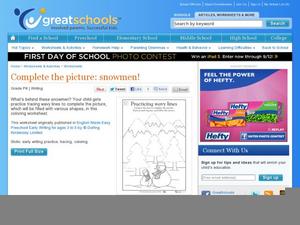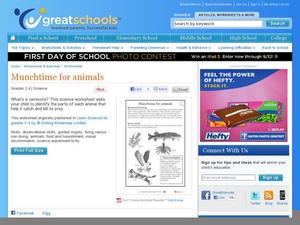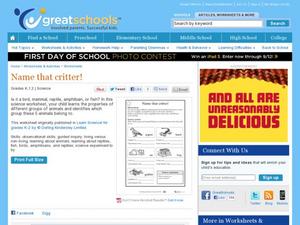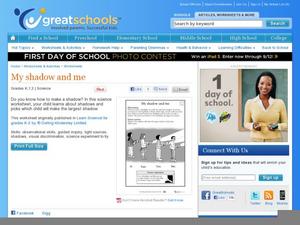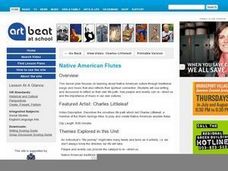Curated OER
Match the Words
Even if your kids aren't reading yet, they can become familiar with words by identifying two that are the same. Youngsters focus on the word same as they examine eight words and match them to their identical spellings....
Curated OER
Syllables
How many syllables? This practice worksheet starts with a brief introduction on segmenting words, encouraging kids to say words aloud. They categorize 12 words into lists based on number of syllables: one, two, or...
DK Publishing
Real-Life Problems: Miles, Pounds, and More
Give young arithmeticians an applicable way to use their addition and subtraction skills with these five word problems. Each one presents a scenario requiring they add or subtract numbers with units (money, distance, weight,...
Curated OER
Contractions
Shorten words with contractions. Second graders use apostrophes to shorten words, including harder ones like might not. Next, they write out the longer versions of various contractions. Have them write a story with these contractions for...
Curated OER
Poems: calligrams
Have fun with shape poems! First and second graders write calligrams that add to the meaning of their poems. Great for your poetry unit or if you want to combine poetry and art lessons.
Curated OER
Bend It! Stretch It! Squash It!
Some items keep their shape no matter what happens! Have your kindergarten class choose which items would stay the same if they were bent, stretched, or squashed. The last activity prompts kids to see what happens when they stretch a...
Curated OER
Multiples of 6 #2
Count by six with these helpful activities. After completing number sequences and multiplication problems from the six times table, third graders solve problems that are written out at the bottom of the page. An excellent way to work on...
Curated OER
Complete the Picture: Snowmen!
Finish the winter wonderland with your preschoolers. They trace pine trees and the tops of mountains to complete the snowy drawing. Have them color their paper and display the drawings during a winter unit!
Curated OER
Days of the Week
Cover both capitalization and the days of the week with a great kindergarten activity! Kids read each day of the week out loud, then write the name of the day on a line. They answer three questions about certain days of the week,...
Curated OER
Getting nosy
A nose knows! Connect animals to their noses with a fun science activity. Animals include elephants, rats, pigs, and even humans. For a science exploration, kindergartners answer questions about what they can smell. A great addition to...
Curated OER
Growing
Growing is part of being a living thing. Kindergartners decide which illustrations represent the life cycle of a living thing, then put a check mark next to the correct pictures. They then examine their own growth on a height chart.
Curated OER
How Light Can "Bend"
Examine the properties of light with a fifth grade science experiment. Pupils find out how light bounces off the surface of a mirror, as well as how a periscope works. For the science investigation part, kids build their own periscope...
Curated OER
Munchtime for animals
Which animals eat meat to stay alive? Third graders group fish, hawks, and cats into carnivores and herbivores. An extended activity prompts kids to cut out magazine pictures of different animals according to the foods that they eat.
Curated OER
Name That Critter
Young learners classify five different animals into their proper category. The animals pictured are a pigeon, a lizard, a cat, a frog, and a goldfish. Pupils are also asked to tell why they know it's a certain kind of animal. An...
Curated OER
My Shadow and Me
Practice making shadows with a kindergarten science experiment. After deciding which picture would represent the biggest shadow, kids use a flashlight to experiment with their own shadows. For extra fun, have kids mark their shadows...
Curated OER
Ring-A-Ding-Ding!
What sound does metal make when you hit it? Kindergartners and first graders conduct an experiment about the properties of metal. First, they draw a line between metal items and descriptions of each. Next, they use a magnet to see which...
Curated OER
Question words, question marks
Practice the five W's and question marks with a fun grammar worksheet. After copying the words who, what, where, when, why, and how, kindergartners fill the words into various questions. For extra practice, have kids come up with their...
Curated OER
Emergency? Ask A Kid!
What is an actual emergency situation and what should you do to prepare for it? Learners will identify a variety of emergency situations and the appropriate way to address first aid concerns to minimize injuries. They will also discover...
King Country
Lesson 4: Relationships - Day 2: Gender Identification
Gender roles and gender identity are the focus of a lesson designed for high school special education classes. Read the introduction to the packet carefully, as it contains advice about how to approach the subject with your...
Curated OER
Language Dialects and the Film "Nell"
Students view the film "Nell" and analyze it for presentation of language pathologies and dialects. They consider the definition of dialect, research phonetic representation of dialects and observe their own communities for speech patterns.
Deliberating in a Democracy
Free and Independent Press
Students determine how free press principles can be compromised. For this global studies lesson, students read an article titled "Free and Independent Press." Students respond to discussion questions regarding the article.
Curated OER
The State of "No Child Left Behind"
Your class can read about the changes Obama considered making to Bush's No Child Left Behind Act. After reading the article, pupils answer 13 questions that ask, who, what, when, where, and why.
Curated OER
Structure of Natural Narratives
Class pairs select a prompt from a provided list and tell (and record) their story to their partner. They then examine linguist William Labov's model for natural narratives, and apply his model to their tale. Next, class members watch...
Curated OER
Native American Flutes - Activity 1
Students discuss Native American culture and musical techniques after viewing a video of Charles Littleleaf, a member of the Warm Springs tribe and a creator of Native American wood flutes.









